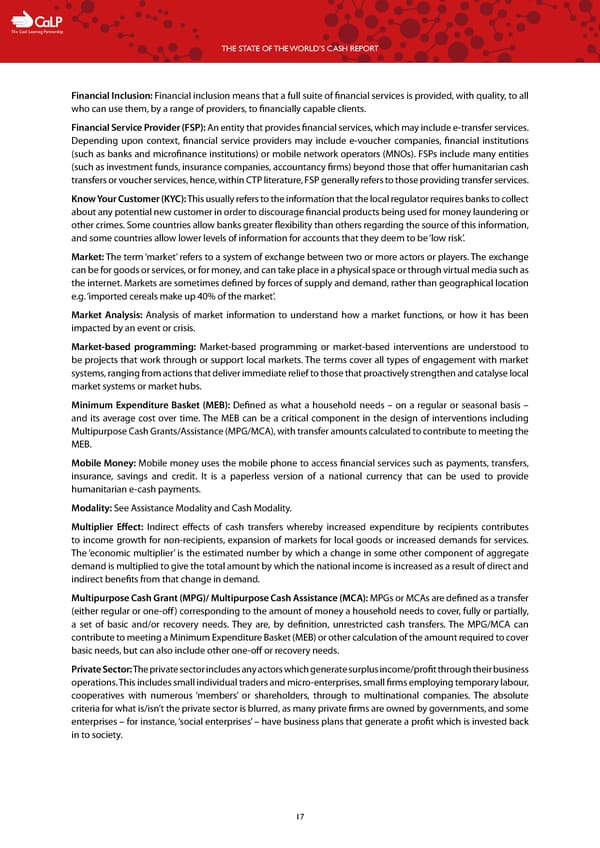C The Cash Learning Partnership THE STATE OF THE WORLD’S CASH REPORT Financial Inclusion: Financial inclusion means that a full suite of financial services is provided, with quality, to all who can use them, by a range of providers, to financially capable clients. Financial Service Provider (FSP): An entity that provides financial services, which may include e-transfer services. Depending upon context, financial service providers may include e-voucher companies, financial institutions (such as banks and microfinance institutions) or mobile network operators (MNOs). FSPs include many entities (such as investment funds, insurance companies, accountancy firms) beyond those that offer humanitarian cash transfers or voucher services, hence, within CTP literature, FSP generally refers to those providing transfer services. Know Your Customer (KYC): This usually refers to the information that the local regulator requires banks to collect about any potential new customer in order to discourage financial products being used for money laundering or other crimes. Some countries allow banks greater flexibility than others regarding the source of this information, and some countries allow lower levels of information for accounts that they deem to be ‘low risk’. Market: The term ‘market’ refers to a system of exchange between two or more actors or players. The exchange can be for goods or services, or for money, and can take place in a physical space or through virtual media such as the internet. Markets are sometimes defined by forces of supply and demand, rather than geographical location e.g. ‘imported cereals make up 40% of the market’. Market Analysis: Analysis of market information to understand how a market functions, or how it has been impacted by an event or crisis. Market-based programming: Market-based programming or market-based interventions are understood to be projects that work through or support local markets. The terms cover all types of engagement with market systems, ranging from actions that deliver immediate relief to those that proactively strengthen and catalyse local market systems or market hubs. Minimum Expenditure Basket (MEB): Defined as what a household needs – on a regular or seasonal basis – and its average cost over time. The MEB can be a critical component in the design of interventions including Multipurpose Cash Grants/Assistance (MPG/MCA), with transfer amounts calculated to contribute to meeting the MEB. Mobile Money: Mobile money uses the mobile phone to access financial services such as payments, transfers, insurance, savings and credit. It is a paperless version of a national currency that can be used to provide humanitarian e-cash payments. Modality: See Assistance Modality and Cash Modality. Multiplier Effect: Indirect effects of cash transfers whereby increased expenditure by recipients contributes to income growth for non-recipients, expansion of markets for local goods or increased demands for services. The ‘economic multiplier’ is the estimated number by which a change in some other component of aggregate demand is multiplied to give the total amount by which the national income is increased as a result of direct and indirect benefits from that change in demand. Multipurpose Cash Grant (MPG)/ Multipurpose Cash Assistance (MCA): MPGs or MCAs are defined as a transfer (either regular or one-off) corresponding to the amount of money a household needs to cover, fully or partially, a set of basic and/or recovery needs. They are, by definition, unrestricted cash transfers. The MPG/MCA can contribute to meeting a Minimum Expenditure Basket (MEB) or other calculation of the amount required to cover basic needs, but can also include other one-off or recovery needs. Private Sector: The private sector includes any actors which generate surplus income/profit through their business operations. This includes small individual traders and micro-enterprises, small firms employing temporary labour, cooperatives with numerous ‘members’ or shareholders, through to multinational companies. The absolute criteria for what is/isn’t the private sector is blurred, as many private firms are owned by governments, and some enterprises – for instance, ‘social enterprises’ – have business plans that generate a profit which is invested back in to society. 17
 The State of the World's Cash | Full Report Page 18 Page 20
The State of the World's Cash | Full Report Page 18 Page 20